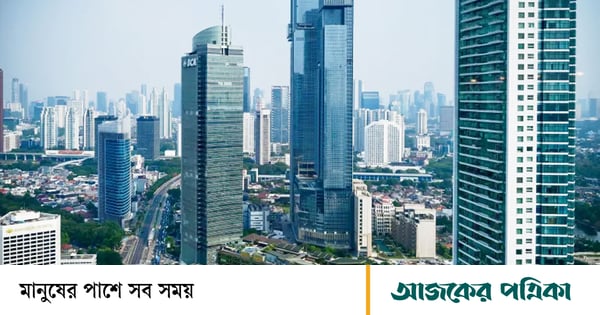Halima Nasutian from Indonesia's North Sumatra province once thought she had everything in life. Over the years, she and her husband, Agus Saputra, managed to save money despite weddings, studies and lavish celebrations. They used to earn about 30 lakh rupees or 1 thousand 917 dollars every month despite bearing the expenses of maintaining the siblings of the family.
Despite spending a quarter of their monthly income, the Halima-Agus couple were members of Indonesia's upper middle class. According to the country's government, those who can spend at least 2 million rupees ($127) to 9.99 million rupees ($638) per month are considered middle class.
But everything changed after the Covid-19 pandemic. Indonesia's middle class is slowly shrinking. “We have lost everything (due to the Covid pandemic),” Halima Nasutiyan told Al-Jazeera. A few more years have passed since that pandemic. But still Halima-Agus couple is eating to go back to their previous position.
The Halima-Agus couple is one of millions of families in Indonesia who have fallen out of the middle class. According to the data of the country's Central Bureau of Statistics, the number of middle class people in 2019 was 5 crore 73 lakh. This year it has reduced to 4 crore 78 lakh. However, the number of emerging middle class increased from 12.88 million to 13.75 million during the same period. These two classes account for nearly two-thirds of Indonesia's 277 million people.
Analysts say the impact of the Covid-19 pandemic and the limitations of the social security system are the main reasons for this decline. Aga Kurnia Yazid, policy expert at the National Poverty Reduction Acceleration Team, said, 'Various interconnected factors are responsible for the shrinking of the middle class. The middle class is a major contributor to tax revenue. But they receive very limited social assistance. Much of this support is delivered through formal employment, such as job security and national health insurance.' He said, 'Cash assistance and other assistance programs like fuel subsidy often go wrong. These aids do not properly reach this class.'
Nasutiyan and her husband suffered from lack of government support during the pandemic. Nusatian said, 'We did not get any help from the central government after losing our jobs during the pandemic. I received only 3 lakh rupees (about 19 dollars) per month from the local office in the village, which only went out to buy daily necessities.'
After the epidemic, the economy of Indonesia, which is number 10 in the list of the world's top economies, began to move forward at a steady pace. Where the annual GDP growth rate of the country is about 5 percent. As Indonesia's economy, like other developing countries, is dependent on global trade, the country's trade has also been under pressure due to the slowdown in global economic growth.
Indonesia's economist Yazid said, 'Major trade partners such as the United States, China and Japan are in contraction. This is reflected in the PMI (Purchasing Managers Index) index. As a result, international demand for Indonesian products is decreasing. This is putting more pressure on the middle class.'
Adinova Fourie, an economic researcher at the international think tank Center for Strategic and International Studies (CSIS), said, 'Indonesia's middle class crisis highlights deeper structural problems. In particular, the impact of the decline of the industrial sector in the country is evident.'
Fourie added, 'Where once the industrial sector employed the majority of workers, it is no longer possible. A large part of the workforce has shifted to the service sector. But most of it is in the informal sector, where wages are low and social protection is virtually non-existent.'
“Improving workers' conditions and productivity is imperative,” Faury said. He said, 'Competing with countries like Vietnam or Bangladesh is not only possible on the basis of low wages, but the conditions and regulations of the workers must be improved. This will enable entry into new markets such as the US, where improved labor standards are important.'
“Productivity is an important issue,” Fourey added. Not only in terms of efficiency, but also in terms of workers' health conditions. Learn from other countries. Productivity should be increased through investment in research and development and innovation. “
Meanwhile, Prabowo Subianto was sworn in as the eighth president of Indonesia last month. During the presidential campaign, Prabowo promised to achieve 8 percent GDP growth and eradicate poverty and child malnutrition. For this he talked about the plan to start a free food program in schools.
But promises and reality are different. Because, more than two years after Covid, Nasutyan and his family are still trying to put their shattered lives back together. They bought furniture and other items for their families in installments. But after buying these, their business stopped. Then they got into financial trouble.
“We have sold our cars, land and mortgaged the house,” says Nasutiyan. all over Our business has completely stopped.' After that, Nasutyan's husband was forced to take another job in order to earn a living. He joined the work of collecting palm fruits. Monthly income is only 28 lakh rupees (about 179 dollars).
Nasutyan himself took a job as a cleaner. Works from 8am to 1pm, six days a week. Monthly salary is only 10 lakh rupees. Currently, the couple's monthly expenses are limited to two million rupees (about $127). This amount of spending is considered the minimum limit for middle-class life in Indonesia.
Nasutiyan said, 'Our life is completely different now. We are not as stable as we used to be. Need capital to start business again, but no money to save.' “We are somehow making money to survive,” he said. Life is full of ups and downs. Hopefully, the situation will change one day. Trust in God.'

